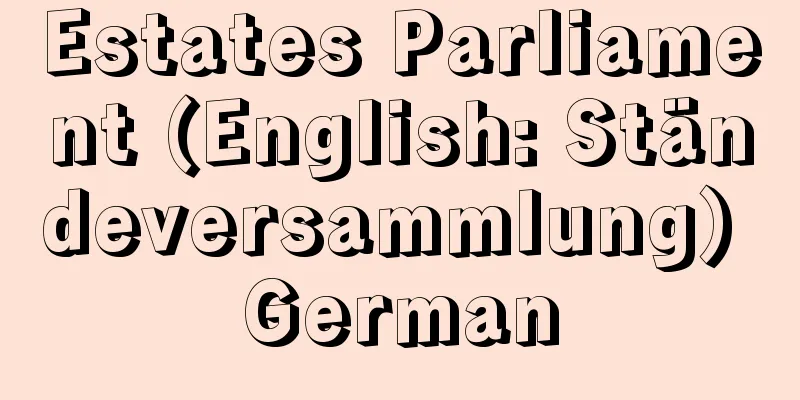Estates Parliament (English: Ständeversammlung) German

|
In European countries from the late Middle Ages onwards, this referred to a parliament based on a class-based society and organized according to class, which continued until the establishment of modern democratic states and was replaced by a representative parliament based on the principle of popular sovereignty. It is also called a tribal assembly. [Shosuke Hirajo] formExamples of estates include the British Parliament, the Three Estates General in France, the Imperial Diet of Germany (Holy Roman Empire) and the territorial assemblies of each state, the Cortes in Spain, and the Zemsky Sobor (National Assembly) in Russia. Estates assemblies are divided into two types: those with a tripartite system of clergy, nobility, and citizens, such as the Three Estates General in France and most of the Imperial Diet and territorial assemblies of Germany, and those with a bicameral system, such as Hungary and Scandinavian countries, with an upper house of higher clergy and nobility and a lower house of lower house of lower nobility and citizens of the knighthood. The British Parliament is bicameral, but the members of the lower house (the so-called Commons) have been representatives of the states since early times, and strictly speaking, it has the characteristics of a transitional type to a modern representative parliament rather than an estates parliament. There are also exceptional cases, such as the territorial assembly of Tyrol in Austria, where peasant representatives were allowed to attend. [Shosuke Hirajo] originThe origin of estates assemblies can be found in the court assemblies convened by the king in feudal states. Under the feudal system, the king's direct vassals had the duty to "advise and assist" the king. Specifically, "advise" meant the obligation to attend the king's summons and answer questions, while "assistance" meant the obligation to provide military service and subsidy (taille) requested by the king. However, at this stage, the king was not yet obligated to convene court assemblies, and the members of the assemblies were not fixed, and the king simply summoned those he deemed necessary each time. In late medieval European countries, the phenomenon of strengthening and rising royal power can be seen, but this was accompanied by an increase in the king's duties, and it became necessary to establish finances to enable them to carry them out. Under the principle of feudalism, the king's finances were mainly covered by the revenue from royal lands, and he had no other option than to rely on the above-mentioned subsidies, but from the end of the 13th century onwards, the principle that the king could use general taxation in addition to the revenue from royal lands for issues related to public affairs was gradually accepted. On the other hand, however, the feudal legal idea that "what concerns everyone must be approved by everyone" remained deeply rooted, so the king had to obtain the approval of his direct vassals and cities, which were directly subject to taxation, every time he imposed a tax. With this approval of taxation as a turning point, the Court Assembly, which had previously only been an advisory body to the King, gradually took on an organizational structure and developed into a conference of the feudal estates, including representatives of the citizens.Since it was more convenient for the royal authority to consult the conference than to obtain approval for taxation through individual negotiations, it became customary to convene such conferences when necessary.From the late Middle Ages onwards, estate assemblies took firm root in the state system, and the feudal state was transformed into a status state. [Shosuke Hirajo] Capabilities and limitationsIt is generally said that premodern European states developed through three stages: feudal states, estate states, and absolutist states. Estate assemblies themselves continued to exist from the end of feudal states until the era of absolutism, but it was in estate states that they played their most important political role. The main function of estate assemblies was the right to approve taxation, but in exchange for approval of taxation, the estates often demanded the expansion of estate privileges, and the assemblies were seen as a place of competition between the interests of the monarchy and the interests of the estates. Furthermore, the estates constantly sought to expand their say in all matters of state, so they played a role in limiting and restraining the arbitrariness of the monarchy. For example, internal disputes within the monarch's family and marriages of the monarch's children were originally matters that belonged to the private affairs of the monarch's household, but on the other hand, these matters could potentially cause changes in territory, and as a result, the practice of requiring the intervention and approval of estate assemblies was established, which resulted in the clarification of the public nature of the state. Of course, the Estates' Assembly did not represent the interests of the entire nation like a representative assembly, but merely reflected the interests of the various estates, and the interests of the different estates did not necessarily coincide, so the king could use this to eliminate the political binding power of the Estates' Assembly, and there were many cases where he was successful in doing so. [Shosuke Hirajo] declineWith the establishment of absolutist states and the success of monarchs in introducing permanent taxes and establishing standing armies, the political function of the Estates was greatly weakened, and assemblies were rarely convened, or even not convened at all, as in the case of the Three Estates General in France. When describing the characteristic of monarchical power in absolutism as "free from the constraints of law," the "constraints of law" meant the political constraints on the royal power by the Estates. [Shosuke Hirajo] Source: Shogakukan Encyclopedia Nipponica About Encyclopedia Nipponica Information | Legend |
|
中世末期以降のヨーロッパ諸国において、身分制社会を土台とし、身分別に編成された議会をさし、近代的民主制国家が成立し、人民主権の原則にたつ代議制議会にとってかわられるまで続いた。等族会議ともいう。 [平城照介] 形態身分制議会としては、イギリスのパーラメント、フランスの三部会、ドイツ(神聖ローマ帝国)の帝国議会や各領邦国家における領邦議会、スペインのコルテス、ロシアのゼムスキー・ソボール(全国会議)などがあげられる。身分制議会には、フランスの三部会やドイツの帝国議会と領邦議会の大部分のように、聖職者、貴族、市民の三部会制をとるタイプと、ハンガリーや北欧諸国のように、高級聖職者および大貴族の上院と、騎士身分の下級貴族および市民で構成される下院という二院制をとるタイプとに区別される。イギリスのパーラメントは二院型であるが、下院の構成員(いわゆる庶民Commons)は早くから各州の代表という性格をもち、厳密にいうと身分制議会というよりは、近代的代議制議会への移行型という特徴を有していた。またオーストリアのチロールの領邦議会のように、農民代表の出席を認めた例外的ケースもある。 [平城照介] 起源身分制議会の起源は、封建国家において国王の招集する宮廷会議にある。封建制度の下で国王の直属封臣は、国王に対し「助言と援助」の義務を負っていた。具体的にいえば、「助言」とは国王の招集に応じて会議に出席し、諮問に答える義務を意味し、「援助」とは軍役奉仕のほか、国王が要求する援助金(タイユ)を提供する義務を意味した。ただこの段階では、まだ国王は宮廷会議の招集を義務づけられておらず、会議の構成員も一定ではなく、国王はそのつど必要と考える者を招集したにすぎない。中世後期のヨーロッパ諸国では、王権の強化・上昇という現象が認められるが、それは国王の任務の増大を伴い、その遂行を可能とする財政を確立することが必要となってきた。封建制の原則では、国王の財政は主として王領地収入によってまかなわれ、それ以外には前述の援助金に頼るより方法がなかったが、13世紀末以降、公共のことに関係する問題については、国王は王領地収入以外に一般的課税によることができるという原則がしだいに認められるようになった。しかし他方、「すべての人に関係することは、すべての人によって承認されねばならぬ」という封建的法観念も根強く残っていたので、国王は課税のたびに、直接課税対象となる直属封臣や都市などの承認を獲得せねばならなかった。この課税承認を契機として、国王の諮問機関にすぎなかった宮廷会議は、しだいに会議体としての組織を整え、市民の代表をも加えた、封建諸身分の会議へと発展し、王権の側でも個別的折衝によって課税の承認を獲得するより、会議に諮るほうが便宜であったため、必要に応じてこのような会議を招集することが慣行となり、中世末期以降、身分制議会は国制のなかに確固とした根を下ろし、封建国家は身分制国家へと転換するに至った。 [平城照介] 機能と限界一般にヨーロッパにおける近代以前の国家は、封建国家、身分制国家、絶対主義の国家という三段階を経過して発展したといわれる。身分制議会自体は、封建国家の末期から絶対主義時代に至るまで存続したのであるが、それが政治的にもっとも重要な機能を果たしたのは、身分制国家においてである。身分制議会の主要な機能は課税承認権であったが、諸身分は課税の承認と引き換えに、身分的特権の拡大を要求することがしばしば行われ、議会は王権の利害と諸身分の利害との角逐の場の観を呈した。さらに諸身分は国事全般への発言権を絶えず拡大しようと努めたので、王権の恣意(しい)を制限し、拘束するという機能を果たした。たとえば、君主家門の内紛、君主の子女の結婚などは、本来は君主の家の私事に属する事柄であったが、他面これは領土の変更などを引き起こす可能性を含む事柄でもあり、そのため身分制議会の介入や承認を必要とするという慣行が確立していった結果、国家の公的性格が明確化していくという結果をも生んだ。もちろん身分制議会は、代議制議会のように全国民の利害を代表したわけではなく、あくまでも諸身分の利害を反映したにすぎず、しかも異なった身分間の利害はかならずしも一致していなかったので、国王はそれを利用して身分制議会の政治的拘束力を排除することが可能であり、それに成功した例もまれではなかった。そこに身分制議会の内包する限界があったわけである。 [平城照介] 衰退絶対主義の国家が成立し、君主が恒常的租税の導入と常備軍の設置に成功した結果、身分制議会の政治的機能は大幅に後退し、議会も招集されることがまれになるか、フランスの全国三部会のように、まったく招集されないという事態さえ生じた。絶対主義absolutismの君主権力の特徴を「法の拘束から解き放されている」Ab solutus regibusと表現するときの「法の拘束」とは、身分制議会による王権の政治的拘束を意味していたのである。 [平城照介] 出典 小学館 日本大百科全書(ニッポニカ)日本大百科全書(ニッポニカ)について 情報 | 凡例 |
<<: Class State - Mibunsei Kokka (English spelling)
>>: Social hierarchy - Mibunkaisousei
Recommend
Phraya Chakri (English spelling)
…Founder of the current Thai dynasty, the Rattana...
extrema unctio (English spelling) extreme unctio
… The Church first included the seven numbers of ...
Senapati (English spelling)
[raw]? [Died] 1601 The founder of the Mataram King...
First-order triangulation network
...If adjacent triangulation points of all first-...
Gulbarga (English spelling)
A city in the north of Karnataka state in southwes...
Storehouse - Osame-dono
〘noun〙① A place to store valuables such as gold an...
Banghazi (English spelling)
...Population: 446,000 (1988). In Arabic, it is c...
Plateau - Kougen (English spelling)
This refers to a flat terrain at high altitudes, ...
Philipp der Grossmütige (English spelling)
… [Swiss Reformation] Prior to this, since 1522, ...
Danuvius
…The remains of Celtic settlements are widely dis...
Mezzanine floor - Middle floor
〘Noun〙① A floor that is lower than an ordinary sec...
Hiraga Shugaku - Hiraga Shugaku
This was the purge of the Faculty of Economics at ...
Sacred disease - morbus sacer (Latin)
A colloquial name for epilepsy, which was widespre...
Patriot Alliance - Aikokushadomei
…During this time, he published a collection of p...
Ueno Park
This park is located in the west of Taito Ward, T...









